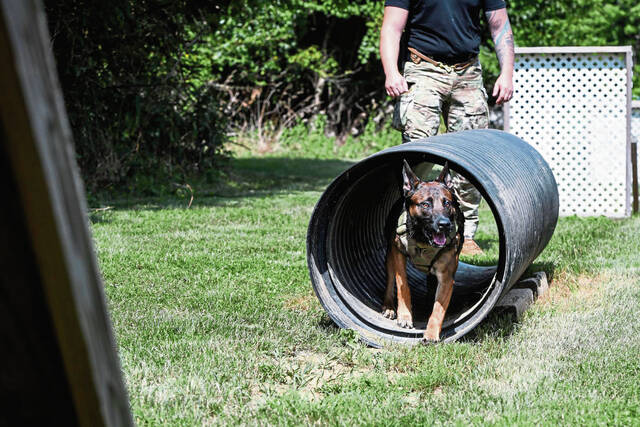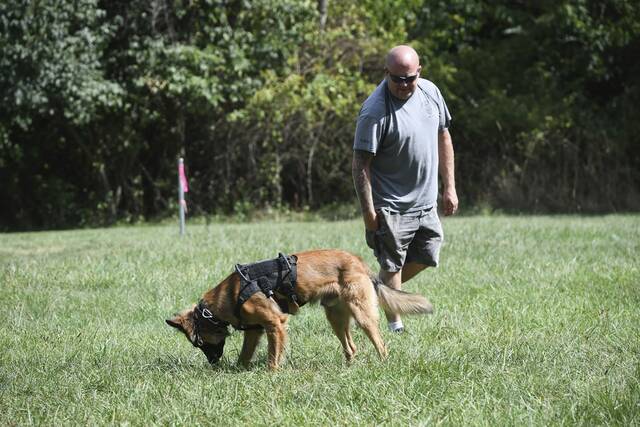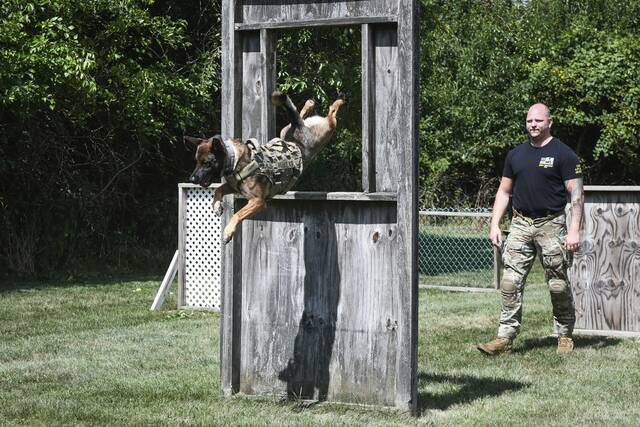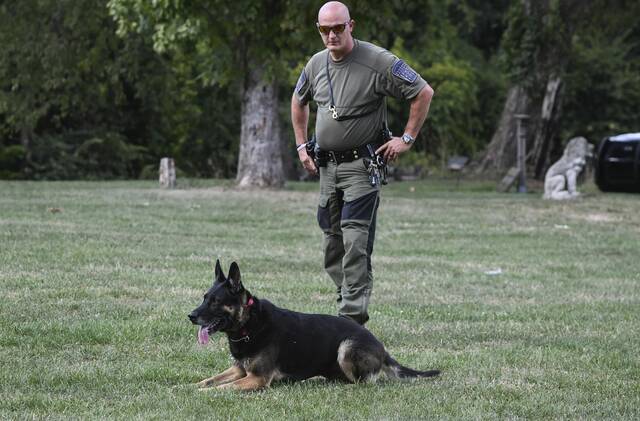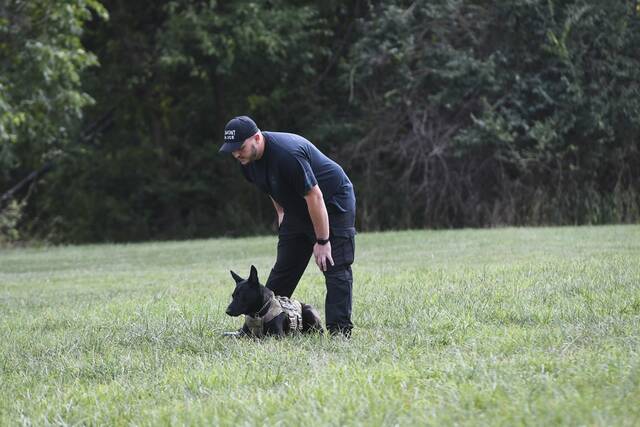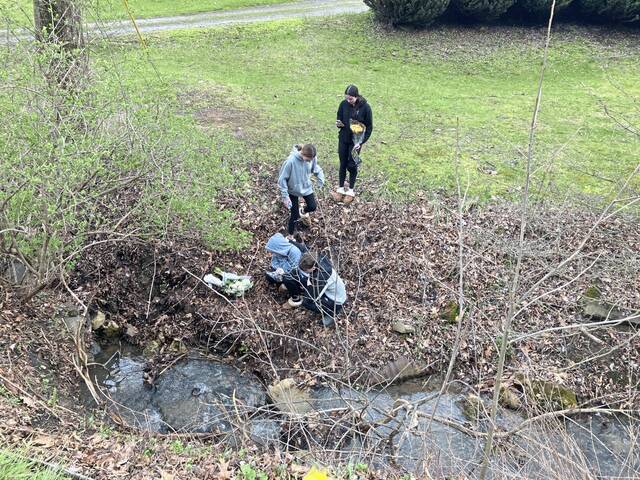Police departments say they can be more creative in their approach to law enforcement when there is a dog on their squad.
They also need to be creative when figuring out how to pay for it.
Donations are often sought to help cover the purchase and ongoing costs of a police dog. Bill Sombo, a master trainer who operates in North Huntingdon, said all of the costs, including those put to taxpayers, are outweighed by the value police dogs bring to their communities.
“There’s a return on your money,” he said, “it all depends on how well the dog’s used.”
Police dog programs around the region have been in the spotlight as some departments bring on new dogs and others retire, while the workload of two canines in one municipality was abruptly halted.
An estimated 15 departments in Westmoreland County have police dogs, and most are certified to serve a dual purpose, working in both narcotics detection and general patrols.
The dual purpose dogs offer departments the most bang for the buck, officials say.
Startup costs can range from $7,200 to $15,000 for a police dog, not including basic training, Sombo said. Specialized training for a dual purpose dog runs around $6,000.
That’s where municipalities typically rely on a generous benefactor.
Country singer Brian Kelley surprised a 12-year-old Harrison girl over the weekend by buying an 18-month-old German shepherd for the Tarentum police department. Kaley Bastine had organized a concert with Kelley to raise money to put toward what she believed would be the eventual purchase of the dog.
Westmoreland County District Attorney Nicole Ziccarelli this year tapped into a drug forfeiture account to give $6,000 to the Delmont police department for training of its police dog and put $5,000 toward the purchase of a dog for the Westmoreland County Prison.
“They’re a useful tool,” said Robert Hickman, master trainer and president of the North American Police Working Dog Association.
“Every department should have a police dog,” Sombo said.
Police dogs can be a deterrent to criminal activity and prompt would-be criminals to bypass a community that has one, Sombo and Hickman said. Police dogs can be used in a variety of roles, including helping to locate weapons used in crimes, performing building or area searches, tracking missing people and helping with arrests. Sometimes their appeal can help with public relations.
Delmont restarted its police dog program this year with a Belgian Malinois, Dirk, and about $60,000 in state funding.
Over 14 years, the Ben Roethlisberger Foundation distributed nearly $2 million nationwide to help departments with police dog-related costs, including the Allegheny County Sheriff’s Office and Allegheny Valley Regional Police Department.
Handler challenges
Last month, Latrobe retired its 8-year-old German shepherd Zeus, and Jeannette officials unexpectedly ended the city’s longtime program that featured a Belgian Malinois, Diesel, and a Dutch shepherd, Kilo.
The disbandment of Jeannette’s program came about a month after two handlers filed a federal lawsuit, claiming the city violated labor laws by not paying overtime and costs associated with caring for the two dogs outside of normal working hours.
“The police dog is not like the weapons and the gun belt they give us,” Hickman said. “Police K-9s, they’re living breathing animals. … The handler’s life now revolves around these dogs 24/7.”
When helping a department get a program running, Sombo said, he makes sure the municipality is aware of the handler’s rights related to in-home care of the canine.
According to Sombo and Hickman, a municipality doesn’t have to pay a handler overtime — they can get creative and allow the handler to end their shift early to account for time at home spent caring for the dog.
“That does not mean the department has to pay money,” Sombo said. “They can compensate the officer in time.”
Jeannette officials estimated in documents provided last week that additional overtime related to in-home care could cost the city as much as $35,000 per officer.
Canine units are required by state law to have at least 16 hours of monthly maintenance training and an evaluation by a trainer at least annually. Sombo works with 25 to 30 local handlers and dogs weekly through Strategic Law Enforcement K9 Training Inc.
Annual costs totaling several hundred dollars related to veterinarian visits and insurance could be covered by taxpayers or fundraisers.
While it is an expensive endeavor to have a four-legged officer, Sombo and Hickman say the benefits are worth it.
“You cannot put a value to a K-9 on a scene when you don’t know … the bad guy has given up only because the K-9 was there,” Sombo said. “Just because the dog was out of the car, how much value is that?”
Workload varies
The amount of work a police dog can have is dependent upon its handler’s assignment and the community where it is located. Hickman said some police dogs respond strictly to felony situations and go from one call to the next while others have an incident a week.
Pittsburgh police dogs have been working with their handlers for several weeks on an enforcement effort Downtown after violent incidents there prompted authorities to bolster their presence. A five-dog unit with the Allegheny County Sheriff’s Office is completely funded through donations.
“You as a K-9 handler have to be able to think outside the box and implement your dog into the case as much as you can,” Sombo said.
Police dogs have benefits for public relations, Hickman said. Many local departments hold demonstrations as a way to connect with residents of all ages and allow them to see the person behind the uniform.
“Suddenly, we’re friendly,” he said.
Westmoreland County Park Police Chief Henry Fontana said the department’s newest dual purpose police dog, Elliott, a Belgian Malinois, started working last year. Elliott joined Rico, a German shepherd and Belgian Malinois mix trained to detect guns and explosives.
The department embarked on a huge fundraising effort to get Elliott and a vehicle outfitted for him and his handler. Any money raised now goes toward maintenance of the program.
Both dogs assist agencies around the county, Fontana said, adding that he’d like to expand the program.
“Everybody loves a dog,” he said. “Those K-9s are great icebreakers, because people will approach you.”



